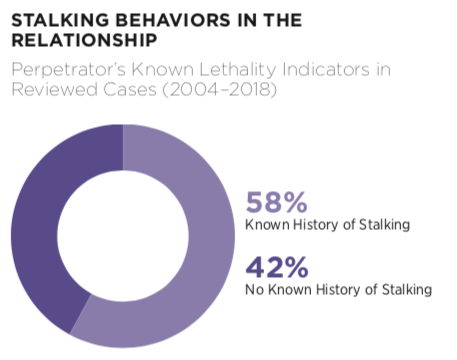Stalking
The term “stalking” most commonly refers to a course of conduct directed at a specific person that would cause a reasonable person to feel fear. This course of conduct, or pattern of behaviors, often includes the following acts by the perpetrator: placing the victim under surveillance; sending unwanted gifts or messages; damaging the victim’s property; making threats to harm the victim, their loved ones, or their property; and harassing the victim privately or in public. Stalking behaviors were known to be present in 58 percent of all cases reviewed by the Project. Our research supports other research nationwide, indicating intimate partner stalkers are the most dangerous type of stalker and stalking is a risk factor for homicide (Mohandie et al., 2006; McFarlane et al., 1999).
Intimate Partner Stalking was the focus of the 2017 Georgia Domestic Violence Fatality Review Project Annual Report. That report covers the tactics used by intimate partner stalkers in-depth and identifies ways to address communities’ response to the issue. The 2017 report can be downloaded from GeorgiaFatalityReview.com/reports/report/2017-report.

